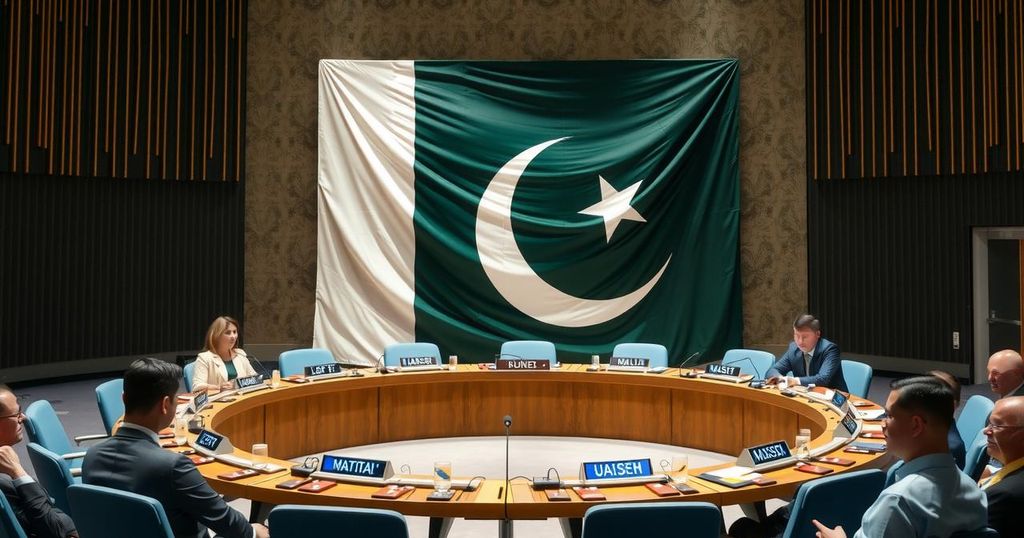Pakistan Begins Eighth Term as Non-Permanent UNSC Member With Flag Installation

Pakistan officially commenced its eighth term as a non-permanent member of the UNSC, with the national flag installed in front of the chamber. Ambassador Asim Iftikhar Ahmad led the installation ceremony, emphasizing Pakistan’s commitment to international peace and its advocacy for oppressed peoples. As a new member, Pakistan will also participate in the Islamic State and Al Qaeda Sanctions Committee, indicating its active role in global security.
The Pakistani national flag was ceremonially installed at the United Nations Security Council (UNSC) as Pakistan commenced its eighth term as a non-permanent member for the 2025-26 period. This two-year term is notable as Pakistan occupies one of the two Asia-Pacific seats vacated by Japan. The flag installation took place alongside four other new non-permanent members, namely Denmark, Greece, Panama, and Somalia, all of which replaced outgoing members at the end of their terms on December 31, 2024.
Ambassador Asim Iftikhar Ahmad, Pakistan’s Alternate Permanent Representative to the UN, presided over the flag installation ceremony. Pakistan’s participation in the council not only allows it to influence discussions on critical international matters, but it also entails significant challenges. Moreover, Pakistan will have a seat on the Islamic State (ISIS) and Al Qaeda Sanctions Committee, which plays a vital role in designating terrorist individuals and groups.
The UNSC, comprised of 15 members—including five permanent members—forms the foremost body of the United Nations and is responsible for maintaining international peace and security. The council holds the authority to issue legally binding decisions, implement sanctions, and authorize military action. In addressing the assembly, Ambassador Ahmad stated, “Pakistan will continue to be guided by the purposes and principles of the UN Charter including maintenance of international peace and security and development of friendly relations among nations based on the principle of equal rights and self-determination.”
He further emphasized Pakistan’s commitment to being a strong advocate for those under foreign occupation, insisting on the need for cooperative multilateralism and the importance of addressing the root causes of both longstanding and emerging conflicts. Ambassador Ahmad concluded by asserting that Pakistan is dedicated to supporting peace efforts and ensuring the effective implementation of Security Council resolutions.
Pakistan’s recent appointment as a non-permanent member of the United Nations Security Council marks the country’s eighth term in this significant role, highlighting its ongoing commitment to international cooperation and diplomacy. The UNSC is a pivotal institution for maintaining global peace and security, with non-permanent members serving crucial terms that allow them to influence important decisions and discussions. This newest term provides Pakistan an opportunity to address pressing global issues and engage collaboratively with other member states. The installation of the Pakistani flag symbolizes not only this recognition but also the responsibilities assumed by the country within the Council’s framework, particularly in terms of promoting dialogue and peace.
In conclusion, Pakistan’s installation at the UNSC as a non-permanent member for its eighth term underscores the nation’s commitment to international diplomacy and peacekeeping. With Ambassador Asim Iftikhar Ahmad representing Pakistan’s positions, the country aims to champion the rights of those under oppression and contribute positively to the agenda of the Council. With challenges ahead, Pakistan is resolved to engage in cooperative efforts to foster stability and security on both regional and global stages.
Original Source: www.dawn.com








